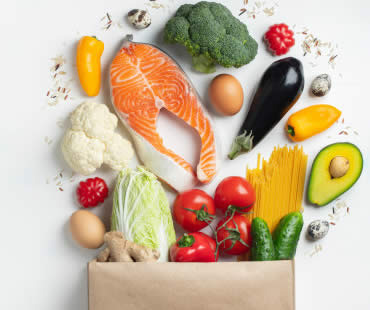Everyone knows that what you eat matters for your health. Your diet impacts your heart, weight, and other areas, including your oral health. Eating a balanced diet will keep your teeth and gums strong, which protects your smile.
These tips will help you make your diet count:
• Choose foods high in calcium. Low-fat milk, yogurt, and cheese offer you great sources of calcium, a mineral that helps your teeth and bones in good shape. Green, leafy vegetables such as broccoli and spinach also provide calcium.
• Limit sugar intake. Though a cookie or the occasional piece of chocolate won’t hurt your smile, eating too many sweets can contribute to cavities. It also important to watch your carbohydrates, like breads, pastas, and potatoes, because these foods may also increase the chance of tooth decay.
• Say no to sodas. Carbonated beverages contain phosphorous and carbonation, acidic substances that can cause enamel erosion. Because sports drinks have a high sugar content, you should limit those as well.
• Go for fruits and vegetables. Apples, carrots, and celery are good options because they are high in nutrients and won’t stick to your teeth.
• Cut back on snacks. When you eat between meals, the food stays on your teeth and can boost your risk for cavities.
• Drink plenty of water. Not only does water have fluoride to strengthen your teeth, but it also helps wash away food and plaque from your teeth.
• Chew sugarless gum. Studies have proven that chewing sugarless gum increases saliva production. Saliva naturally reduces plaque build up and rinses away food particles that encourage the development of tooth decay.
Everyone knows that what you eat matters for your health. Your diet impacts your heart, weight, and other areas, including your oral health. Eating a balanced diet will keep your teeth and gums strong, which protects your smile.
These tips will help you make your diet count:
• Choose foods high in calcium. Low-fat milk, yogurt, and cheese offer you great sources of calcium, a mineral that helps your teeth and bones in good shape. Green, leafy vegetables such as broccoli and spinach also provide calcium.
• Limit sugar intake. Though a cookie or the occasional piece of chocolate won’t hurt your smile, eating too many sweets can contribute to cavities. It also important to watch your carbohydrates, like breads, pastas, and potatoes, because these foods may also increase the chance of tooth decay.
• Say no to sodas. Carbonated beverages contain phosphorous and carbonation, acidic substances that can cause enamel erosion. Because sports drinks have a high sugar content, you should limit those as well.
• Go for fruits and vegetables. Apples, carrots, and celery are good options because they are high in nutrients and won’t stick to your teeth.
• Cut back on snacks. When you eat between meals, the food stays on your teeth and can boost your risk for cavities.
• Drink plenty of water. Not only does water have fluoride to strengthen your teeth, but it also helps wash away food and plaque from your teeth.
• Chew sugarless gum. Studies have proven that chewing sugarless gum increases saliva production. Saliva naturally reduces plaque build up and rinses away food particles that encourage the development of tooth decay.
At Brown, Reynolds & Snow Dentistry we care about your smile and your oral health. Richmond, VA Cosmetic Dentist
Our dental office is located in Toronto


 E-Mail Us
E-Mail Us  416-595-5490
416-595-5490








